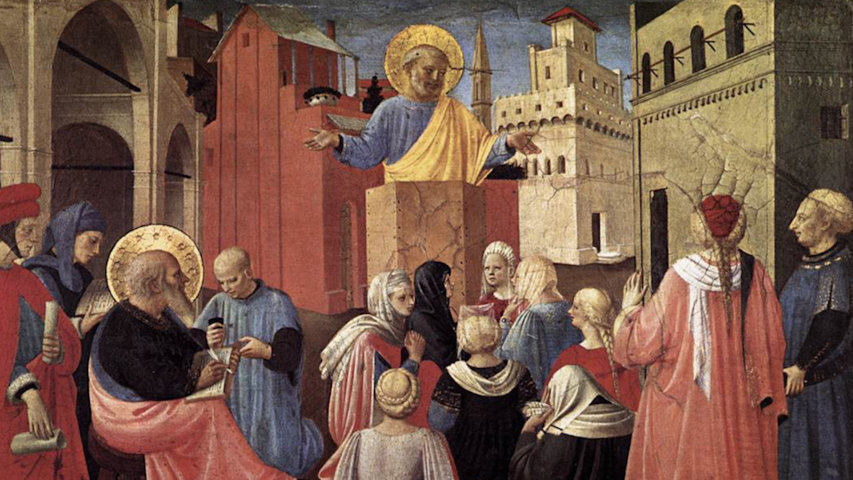The text of a sermon preached at the Cathedral Eucharist on 10 February. I was struck by the way in which Jesus seeks Peter's help; by the experienced fisherman seeing empty nets bursting full in inauspicious circumstances; by the glimpse of holiness in boat. Kenneth Bailey's work on seeking Jesus through middle eastern eyes is so evocative but the text also opened up a response to more contemporary concern for evangelism and what it means for us to tell the story of God's transforming love. The texts Isaiah 6:1-8; I Corinthians 15:1-11; Luke 5:1-11
Do you remember J. R. Hartley?
He is a fictional character, an elderly gentleman. It’s over 30 years since he captured our cultural imagination in an iconic advert for Yellow Pages.
We encountered him looking for a copy Fly Fishing by J. R. Hartley. He goes into one second-hand bookshop after another, asking the same question and receiving the same answer. It’s no where to be found.
He gets home. His daughter hands him the Yellow Pages. From the comfort of his arm chair, he continues his search by ringing around. Eventually he finds a shop which has a copy. The last words we hear are some of the most famous in advertising history:
‘My name? Oh, yes, it’s J.R.Hartley.’
Fly Fishing still features in the top ten ads of all time alongside John Lewis, Levis and Coca Cola. A new generation of marketing experts and advertising creatives, are trying to reinvent or update the impact of the ad using the digital tools at their disposal.
For although Mr Hartley comes from a different age, that basic premise of searching for something remains the same. Instead of flicking through a hard copy of Yellow Pages, we rely on apps, search engines and social networks to track down a particular book, to find a gift or to replace a treasured item.
What are you looking for today?
What is it that we seek?
Some of what we search out reflects basic human need for stability: a living-wage, satisfying work, a regular pension, a place to call home, food and warmth. But our material needs are woven together with our quest for relationship and meaningful intimacy; for emotional support, for people to care about us; for meaning, value, dignity and purpose.
What are you looking for today?
It’s quite possible that we don’t quite know what it is that we seek; and sometimes we don’t realise what it is until we discover it in the unexpected.
Peter’s experience as recounted by Luke is a bit like that: it brings to the surface all sorts of practical needs and reveals a deeper purpose.
Luke sets the scene: it isn’t the patience and tranquility of a riverbank, which might be at the heart of Fly Fishing. Rather we are drawn to a busy and crowded lakeside. There’s a sense of expectation - people want to listen to Jesus, to hear the word of God. But there’s also a sense of tiredness and frustration - Peter and his colleagues are exhausted after a fruitless night’s work and they want to get on with cleaning and mending nets.
Jesus looks to Peter for help. He needs his boat to use as a makeshift platform from which to teach; but he also needs his particular skill as an oarsman to manoeuvre the boat and prevent it from drifting too far from shore.
It’s from this place of confidence within his own world of work that Peter was able to listen to Jesus; in the familiarity and intimacy of his own boat he is caught up in a life-transforming encounter.
Having taught the crowds, Jesus doesn’t ask Peter to row the boat back to the shore. Instead he tells him to go into the deep water and let down the nets. Given that fish hide rather than feed during the day, this sounded preposterous. It’s quite possible that, having worked all night, Peter had a few choice words to say about that request.
Kenneth Bailey, a scholar who invites us to see the Gospels through middle-eastern eyes puts it like this: ‘The very idea that a landlubber from the highlands of Nazareth, who has never wet a line should presume to tell a seasoned fishing captain what to do is preposterous… the order to launch into the deeps in broad daylight is ridiculous!’
Peter's Catch of Fish - Eric de Saussure
Yet, even in his grumpy exhaustion, Peter sets aside his professional opinion and obeys. The result is astonishing. The scale of the catch is indeed miraculous. It is economically lucrative too. All that Peter looks for as a fisherman is fulfilled. As Bailey puts it: ‘This net-tearing, boat-swamping catch can greatly enrich him and his team. At last he has hit the jackpot!’.
Yet, Peter doesn’t look at Jesus as a potential business partner: he responds at a deeper level. There is something here of more value than material gain, commercial success and profit margins.
Peter falls to his knees.
Having addressed his teacher with bravado, he now addresses his Lord with humility.
In the confined space of the boat, with the nets and fish, with the familiar noise and smells, Peter senses that he is in the presence of holiness.
It is a far cry from the splendour and majesty of the Temple. The whole earth is indeed full of God’s glory; glory revealed in Jesus Christ.
Peter’s works echo those of Isaiah as he acknowledges his unworthiness. He is not only seeing Jesus as who he really is, but he is also being seen. As Jeffrey John puts it: ‘Peter’s words… are the authentic response of someone feeling himself, unbearably, exposed to the glare of this vast, unconditional love. He can’t bear it, he wants to run and hid; yet having known it, he could never let it go. He will give up everything to follow it’.
Jesus reaches out to Peter and to James and John too. Amazement and fear become the place of invitation into a new partnership; his skills are to be deployed in a new venture. Jesus takes them from the material world of catching fish to the world of catching people; of drawing them to the new and abundant life found in Jesus.
This is the heart of the good news proclaimed to us and received by us: that in his death and resurrection, Jesus Christ defeats the power sin and death and sets us free to be more fully who we are.
As Paul reminds us, we come to know this good news because someone passed it on to us: by telling us the story or caring for us; by listening to our fears and hopes; by the way they embodied the attractiveness of God’s love in their own lives; by the way they sought forgiveness and justice, compassion and healing.
This is the very heart of evangelism: to know and show and tell of God’s love. This happens in the middle of our lives - in the places which are as familiar to us as Peter’s boat was to him; in lecture halls and offices, in hospital waiting rooms and our own homes.
Here in broken bread and outpoured wine, the good news of God’s transforming love is retold. In the power of the Spirit we are sent out to tell others of what we’ve known and to see lives transformed.
To be a witness is to understand what others are looking for - hope, comfort or challenge; support, dignity or freedom. It is to respond to that search with a love that turns empty nets into abundant life.
To be an evangelist is tell of what we have experience of God’s love; and each of us is sent in the power of the Spirit to live lives and speak words which tell of that goodness.
Whom shall I send?
Here we are; send us.
Let us pray: Lord Jesus Christ, you stretched out your arms of love on the hard wood of the cross, that all might come within reach of your saving embrace. So clothe us in your spirit, that we reach gin forth our hands in love, may bring those who do not know you to the knowledge and love of you, for your own love and mercy’s sake. Amen.
© Julie Gittoes 2019




